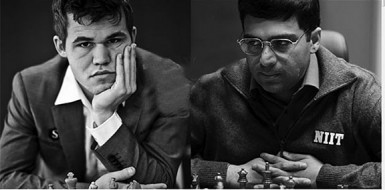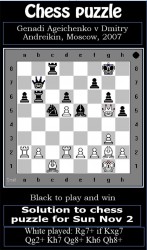The most important activity on the World Chess Federation’s calendar, the World Chess Championship title match, began on Friday and runs until November 28. The match features the incumbent title holder, Norway’s Magnus Carlsen, 23, and challenger, Viswanathan Anand, 44, from India, and is being contested in Sochi, Russia. Carlsen won the championship title from Anand in November 2013, in his hometown, Chennai, without losing a single game in the best-of-12 series. Carlsen won three games and seven were drawn to achieve the 6.5 points which were required for victory.
Anand has been the world chess champion since 2007, and demonstrated his versatility in the ancient brain game. He is the only player to have won titles in three different formats, namely, match, tournament and knockout. Earlier this year, Anand won the Candidates tournament, thereby qualifying him for a return shot at the world championship title.
The championship has long been dominated by players from Russia and, before that, the Soviet Union. However, of late, chess players have been excelling from Asia, particularly from China and India. Carlsen is only the second player from the West to become champion since World War II, and the second since Bobby Fischer, the temperamental American who held the championship from 1972 to 1975. But Carlsen has not achieved the level of celebrity that Fischer, who died in 2008 at age 64, enjoyed. Notwithstanding that circumstance, Carlsen has been the world’s top-ranked player almost continually since 2010, and his current chess rating is the highest in history.
 That Anand did not win a game in the 2013 championship is not without precedent. In 1907, the American Frank Marshall did not win a game against Germany’s Emanuel Lasker in his quest for the title. Three years later, in 1910, Lasker repeated his solid performance against Poland’s David Janowski. In 1921, however, after being champion for a total of 27 consecutive years, it was Lasker’s turn to lose face in similar fashion to the Cuban chess machine, Jose Raul Capablanca. Capablanca crushed Lasker without allowing him to win a game. And during the London 2000 world championship match between Garry Kasparov and Vladimir Kramnik, Kasparov lost without once achieving the full point.
That Anand did not win a game in the 2013 championship is not without precedent. In 1907, the American Frank Marshall did not win a game against Germany’s Emanuel Lasker in his quest for the title. Three years later, in 1910, Lasker repeated his solid performance against Poland’s David Janowski. In 1921, however, after being champion for a total of 27 consecutive years, it was Lasker’s turn to lose face in similar fashion to the Cuban chess machine, Jose Raul Capablanca. Capablanca crushed Lasker without allowing him to win a game. And during the London 2000 world championship match between Garry Kasparov and Vladimir Kramnik, Kasparov lost without once achieving the full point.
An estimated 600 million people play chess worldwide, more than ever before, according to the research firm You Gov. It has also been added to school curriculums in many countries. Despite the record number of players, chess has lost the spotlight in which it basked when Fischer wreaked havoc on Boris Spassky, a Russian. That was the sensational Match of the Century.

The current chess match between Carlsen and Anand may not be a ‘Match of the Century,’ but millions are going to follow the live action via the internet. As Carlsen settles into the match, he is going be staring continuously at a very familiar face, now more matured and seasoned, than when the two competitors met one year ago.
It was heartening to learn that Guyana would be hosting the Umada Cup chess tournament later in the month. I urge all chess players to practise for the big occasion, especially our junior competitors. A number of Caricom chess players will be on show. At the Trophy Stall Junior Chess Championship which is ongoing, there are two female players, Sheriffa Ali and Jessica Clementson, who are among the seven participants. Both will qualify for the Junior Championship and therefore will have an opportunity to play against Hai Feng Su, Guyana’s National Junior chess champion.
Chess games
The following games were played at the FIDE 2014-2015 Grand Prix Chess Tournament in Tashkent, Uzbekistan. The tournament ended last week.
Jobava v Andreikin
White: Baadur Jobava
Black: Dmitry Andreikin
1. d4 d5 2. Nc3 Bf5 3. Bf4 e6 4. e3 Bd6 5. g4 Bg6 6. Nf3 Nd7 7. Bd3 Bxd3 8. Qxd3 Bxf4 9. exf4 h5 10. gxh5 Rxh5 11. Rg1 Qf6 12. Ne5 c6 13. Na4 Qxf4 14. Nf3 e5 15. Rxg7 O-O-O 16. Qe3 Qf6 17. Rg3 exd4 18. Qxd4 Qxd4 19. Nxd4 Rxh2 20. Nf3 Rh1+ 21. Rg1 Rxg1+ 22. Nxg1  d4 23. b3 Ngf6 24. Nf3 c5 25. Nb2 Kc7 26. a4 Re8+ 27. Kf1 Ne4 28. Nd3 b6 29. a5 Kb7 30. b4 Nc3 31. axb6 axb6 32. bxc5 bxc5 33. Nd2 Re2 34. Nb3 Kb6 35. Ra8 Rxc2 36. Ndxc5 Nxc5 37. Nxd4 Rc1+ 38. Kg2 Nd5 39. Rf8 Ne6 0-1.
d4 23. b3 Ngf6 24. Nf3 c5 25. Nb2 Kc7 26. a4 Re8+ 27. Kf1 Ne4 28. Nd3 b6 29. a5 Kb7 30. b4 Nc3 31. axb6 axb6 32. bxc5 bxc5 33. Nd2 Re2 34. Nb3 Kb6 35. Ra8 Rxc2 36. Ndxc5 Nxc5 37. Nxd4 Rc1+ 38. Kg2 Nd5 39. Rf8 Ne6 0-1.
Jakovenko v Mamedyarov
White: Dmitry Jakovenko
Black: Shakhriyar Mamedyarov
1. Nf3 f5 2. c4 Nf6 3. g3 g6 4. b4 d6 5. d4 Bg7 6. Bb2 e5 7. dxe5 Nfd7 8. Bg2 dxe5 9. O-O Qe7 10. e4 O-O 11. b5 Nc5 12. Nc3 Be6 13. Nd5 Qd6 14. Ng5 Nbd7 15. Ba3 Bf7 16. Qc2 c6 17. Nb4 a5 18. Rad1 Qf6 19. Nd3 Qxg5 20. Nxc5 Nxc5 21. Bxc5 Rfd8 22. Bb6 Rdc8 23. exf5 Qxf5 24. Be4 Qe6 25. bxc6 bxc6 26. c5 Qxa2 27. Qxa2 Bxa2 28. Rd6 Bc4 29. Rb1 a4 30. Rxc6 a3 31. Rxc8+ Rxc8 32. c6 a2 33. Ra1 Bf8 34. c7 Bd6 35. Bb7 Bxc7 36. Bxc8 Bxb6 0-1.
Karjakin v Kasimdzhanov
White: Sergey Karjakin
Black: R Kasimdzhanov
1. c4 Nf6 2. Nc3 e5 3. g3 d5 4. cxd5 Nxd5 5. Bg2 Nb6 6. d3 Be7 7. Be3 O-O 8. Rc1 Re8 9. a3 Bf8 10. Nf3 N8d7 11. O-O c6 12. Qb3 Nc5 13. Qc2 Bg4 14. b4 Ncd7 15. h3 Bf5 16. Nd2 h6 17. Rb1 Rc8 18. Rfc1 Nf6 19. Bc5 Nfd7 20. Nce4 Qc7 21. a4 a6 22. Bxf8 Rxf8 23. Nc5 Nf6 24. Qb2 Qe7 25. a5 Na8 26. e4 Bh7 27. Nc4 Rfe8 28. f4 exf4 29. gxf4 Rb8 30. Qe5 Qf8 31. Qd6 Re7 32. f5 Nc7 33. Qf4 Nfe8 34. Kh2 Kh8 35. Bf3 Bg8 36. Ne5 Nf6 37. Rg1 Nb5 38. Ne6 g5 39. Nxf8 gxf4 40. Nfg6+ fxg6 41. Nxg6+ 1-0.
Vachier-Lagrave v Nakmura
White: Vachier-Lagrave
Black: Nakamura
1.e4 e5 2.Nf3 Nc6 3.Bb5 a6 4.Ba4 Nf6 5.O-O b5 6.Bb3 Bc5 7.a4 Rb8 8.axb5 axb5 9.Nxe5 Nxe5 10.d4 Bxd4 11.Qxd4 d6 12.f4 Nc6 13.Qc3 Ne7 14.Qd3 O-O 15.Nc3 b4 16.e5 Bf5 17.Qe2 Nd7 8.Na4 dxe5 19.Be3 Ra8 20.Rad1 Qe8 21.Nc5 Ra5 22.Nb7 Ra8 23.fxe5 Kh8 24.Nd6 cxd6 25.exd6 Bg6 26.dxe7 Qxe7 27.Qf2 Rac8 28.Rd5 Rfe8 29.Bd4 f6 30.Ba4 Red8 1/2-1/2.







